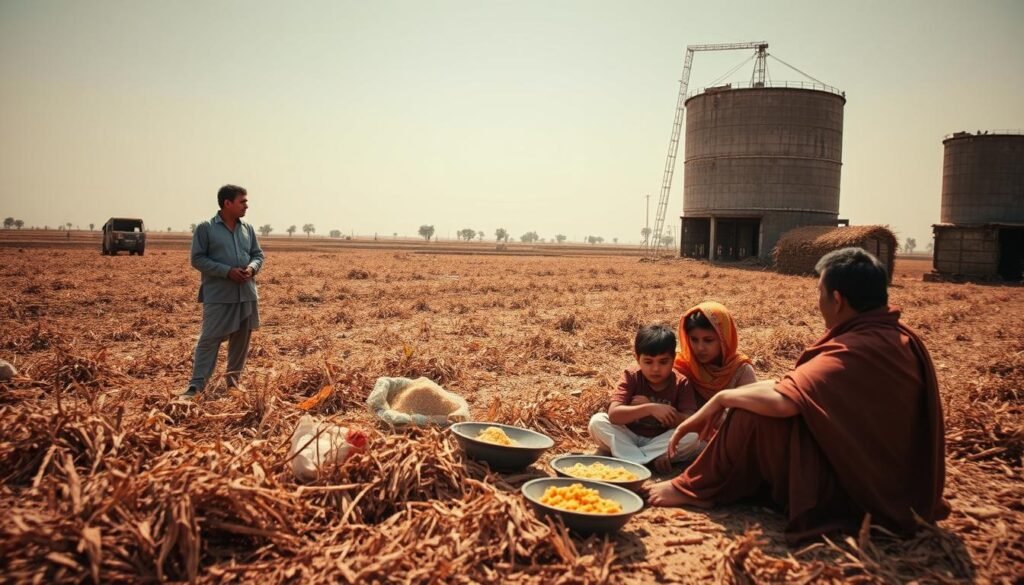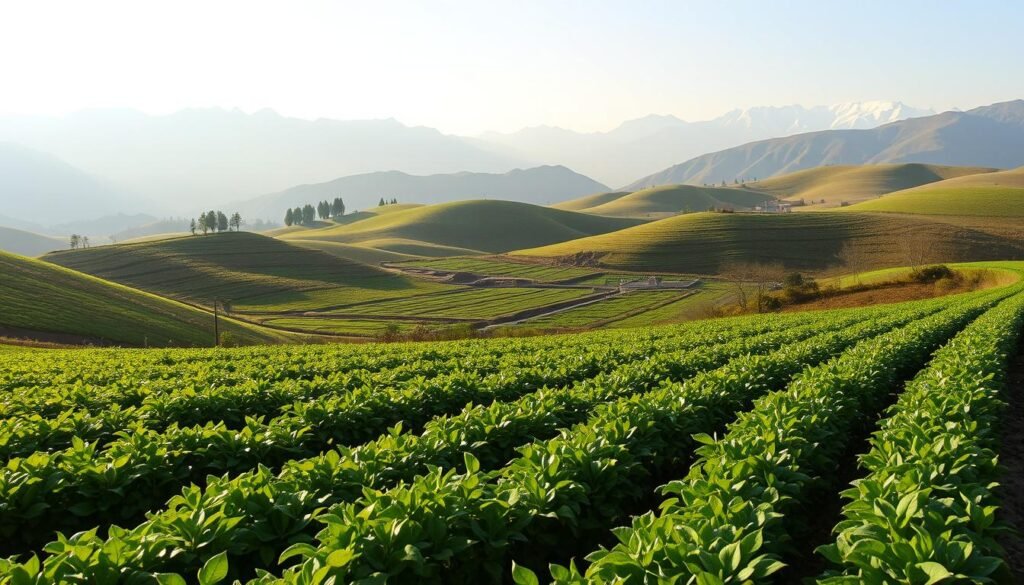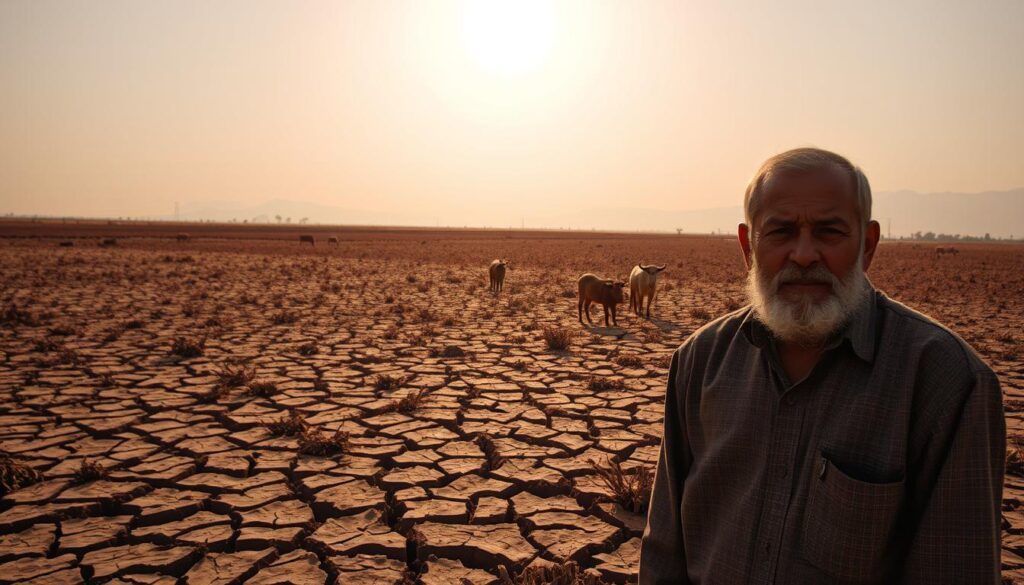Pakistan’s economy depends a lot on farming. It makes up a big part of the country’s GDP. Many people work in farming too.
But, food insecurity is a big problem. A lot of people don’t have enough good food to eat.
Farming in Pakistan has many challenges. There’s not enough water, old farming ways, and bad farming tools. These problems hurt farmers and rural areas a lot.
To fix these issues, we need sustainable farming practices. These practices help grow more food and protect the environment.
This article will look at the agriculture issues in Pakistan. We’ll find ways to make farming better. This will help Pakistan have more food and be more stable economically.
The Current State of Pakistan’s Agricultural Sector
Pakistan’s economy depends a lot on farming. But farming faces many problems. These issues affect the whole country’s economy.
Economic Significance and Contribution to GDP
Farming is very important for Pakistan’s economy. It makes up about 19% of the country’s GDP. Farming also helps bring in money from abroad by selling crops like rice and cotton.
Employment Statistics in Agriculture
Many people in Pakistan work in farming. About 40% of the workforce is in farming. This is especially true in rural areas.
Major Crops and Production Regions
Pakistan grows many crops, like wheat, rice, cotton, and sugarcane. The fertile plains, especially around the Indus River, are great for farming. Places like Punjab and Sindh are big farming areas.
Farming in Pakistan has many problems. Issues like not enough water, bad soil, and old farming ways need to be fixed. Solving these problems is key for farming to keep growing and help the economy.
Understanding the Problem of Agriculture in Pakistan
Pakistan’s agriculture has a long history. It’s key for the country’s economy. It employs many people and helps the GDP.
Historical Context and Development
Agriculture in Pakistan started with the Indus Valley Civilization. Over time, it faced many challenges. The Green Revolution in the 1960s improved crop yields but caused waterlogging and soil salinization.
Current Challenges Overview
Today, Pakistan’s agriculture has big problems. Water scarcity, old farming ways, and no credit for farmers are major issues. The biggest problem is using water badly. The sector uses most of the water.
| Challenge | Description | Impact |
|---|---|---|
| Water Scarcity | Lack of enough water for irrigation | Less crop yields |
| Outdated Farming Practices | Old farming methods | Lower productivity |
| Limited Access to Credit | Farmers can’t get loans | Can’t invest in new farming |
Impact on National Economy
The problems in agriculture hurt Pakistan’s economy. Less food means more imports. This affects the trade balance.
Water Management Crisis in Pakistani Farming
Pakistan’s farming faces a big water crisis. Its farms, key to the economy, need more water. But water is getting harder to find.
Depleting Groundwater Resources
Groundwater is being used too much for farming. This has made water levels drop. It’s a big problem for farming’s future.
Inefficient Irrigation Systems
Farming uses old ways to water crops. This method wastes a lot of water. New ways to water are needed.
Climate Change Impact on Water Availability
Climate change is making water harder to get. Weather patterns are changing. This makes water for farming less reliable.
Drought Mitigation Strategies
To fight drought, new ways to use water are needed. Like catching rainwater and using water-saving crops. Everyone must work together to make it happen.
Sustainable agriculture practices are key. Using water wisely and better irrigation can help. This way, Pakistan can solve its water problems and keep food safe.
Land Management and Soil Health Issues
Good land management and soil care are key for Pakistan’s farming. The country’s farms face big problems like land damage and soil health issues.
Soil Degradation and Erosion
Soil damage and erosion are big worries in Pakistan. They make the land less fertile and less productive. Soil erosion can cause the loss of good soil, bad water, and lower farm output.
- Soil erosion due to water and wind
- Loss of soil organic matter
- Reduced soil fertility
Land Fragmentation Problems
Land breaking into small pieces is a big problem in Pakistan’s farms. It makes farming less efficient and smaller farms.
Chemical Overuse and Soil Fertility
Too much use of chemicals harms the soil, making it less fertile and less diverse. Sustainable farming practices can help fix this.
Soil Restoration Techniques
There are ways to make the soil healthy again, like:
- Organic farming
- Crop rotation and intercropping
- Using compost and green manure
Using these methods can make the soil better, stop erosion, and improve land health. This helps Pakistan’s farms be more sustainable.
Financial Constraints Facing Pakistani Farmers
Financial challenges are big for farmers in Pakistan. The farming sector is key to the country’s economy. But, it faces many money problems that slow its growth.
Limited Access to Credit and Financial Services
Getting loans is hard for many farmers. They don’t have enough money or good credit history. So, they turn to high-interest loans from unofficial lenders.
Input Cost Inflation and Profitability Challenges
Prices for farming stuff like seeds and fertilizers keep going up. This makes it hard for farmers to make money. They also face price drops and no support from the market.
Farmer Debt Crisis and Economic Vulnerability
Many farmers are deep in debt. They borrow money at high rates to farm. This debt makes them very vulnerable to bad crops and market changes.
Microfinance Solutions
Microfinance could help Pakistani farmers. It offers small loans at good rates. It also teaches farmers how to handle money better.
Food Security Challenges in Pakistan
Pakistan faces many food security issues. These include growing population, less food from farms, and bad food distribution. Fixing these problems is key for the people’s health and the country’s growth.
Population Growth vs. Agricultural Production
Pakistan’s people are growing fast. But, the farms can’t keep up. This makes it hard to feed everyone.
Nutritional Security Concerns
Good food is also a big issue. Many people in Pakistan don’t get the nutrients they need. This is why we need better food.
Import Dependency and Trade Balance
Pakistan buys a lot of food from other countries. This hurts its money balance. It makes it hard to spend on other important things.
Food Distribution Inefficiencies
How food is moved around is also a problem. Bad supply chains cause food to go to waste. This makes food hard to find in some places.

| Challenge | Description | Impact |
|---|---|---|
| Population Growth | Rapid population growth outpacing agricultural production | Increased demand for food |
| Nutritional Security | Prevalence of malnutrition and micronutrient deficiencies | Health issues and reduced productivity |
| Import Dependency | Reliance on food imports to meet domestic demand | Strain on trade balance and economy |
| Distribution Inefficiencies | Ineffective supply chains leading to food waste and scarcity | Exacerbated food security challenges |
To solve these problems, we need to do many things. We must grow more food, make sure it’s nutritious, buy less from others, and move food better.
Technological Gaps in Pakistan’s Agriculture Sector
Pakistan’s farms face big tech problems. They are key to the country’s economy but struggle with old ways and lack of new tech.
Outdated Farming Equipment and Techniques
Farmers in Pakistan still use old methods and tools. This makes their work less productive and less efficient. They can’t keep up with global markets because of this.
Digital Divide in Agricultural Information
Farmers in Pakistan don’t have easy access to the info they need. They can’t get the latest advice, weather updates, or market news because of the internet gap.
Research and Development Limitations
Pakistan’s farm research and development are held back. They don’t have enough money or places to work. This stops them from creating and sharing new farming ideas with farmers.
Technology Adoption Barriers
There are big hurdles to using new tech in farming in Pakistan. These include:
- Farmers don’t have enough money
- They don’t know about new farming ways
- They lack basic things like good water systems
| Technological Gap | Impact on Agriculture | Potential Solution |
|---|---|---|
| Outdated farming equipment | Lower productivity and efficiency | Mechanization and modern tool adoption |
| Digital divide | Limited access to information | Digital literacy and internet access |
| R&D limitations | Hindered innovation | Increased funding and infrastructure |
Fixing these tech gaps is key to making Pakistan’s farms better and more sustainable.
Sustainable Farming Practices for Pakistan’s Future
Sustainable farming is key for Pakistan’s farming future. The country faces big challenges like water scarcity and soil damage. Using green farming methods can help solve these problems.

Organic Farming Opportunities
Organic farming is a big chance for Pakistan to be more sustainable. It uses less chemicals, which helps the soil and saves water. Pakistan could become a big exporter of organic food, meeting the world’s growing demand.
Conservation Agriculture Techniques
Conservation agriculture is about gentle farming and keeping the soil covered. It stops soil loss, holds water better, and grows more crops. Pakistani farmers can get stronger against climate change and harm the environment less.
Integrated Pest Management Approaches
Integrated Pest Management (IPM) uses many ways to fight pests. It’s better for the earth and people. IPM also makes crops better and more, helping farmers make more money.
Success Stories in Sustainable Farming
Many farmers in Pakistan have tried green farming and done well. They’ve grown more food and spent less on farming. Their stories show how green farming can work in Pakistan.
By supporting green farming, Pakistan can grow its farms better. This helps farmers and makes the country’s farms stronger. It’s good for everyone involved.
Agricultural Policy Reform Recommendations
Pakistan’s agricultural sector faces big challenges. These include water problems, land damage, and money issues. We need a big plan to fix these problems.
Subsidy Restructuring Needs
The subsidies in Pakistan’s farming sector help the wrong people. Changing subsidies to help small farmers and green practices can make farming better and fairer.
Land Tenure and Reform Proposals
Land issues hurt farming in Pakistan. Land reforms that give farmers secure land can help farmers invest and grow more food.
Regulatory Framework Enhancements
A strong set of rules is key for a green farming sector. Rules on water, pesticides, and seeds are important.
International Best Practices
India and Brazil have good farming policies. India focuses on tech and water use. Brazil boosts farming with new ideas.
| Country | Policy Initiative | Outcome |
|---|---|---|
| India | National Agriculture Policy | Increased irrigation efficiency |
| Brazil | Agricultural Innovation Law | Boosted agricultural productivity |
| Pakistan | Potential Policy Reform | Enhanced food security |
Pakistan can learn from other countries. By using their ideas, Pakistan can grow more food and be more food secure.
Technological Solutions for Agricultural Development in Pakistan
Agriculture in Pakistan is changing fast thanks to new tech. The farming world is getting a big update with modern tools.
Precision Farming Potential
Precision farming is a big deal. It uses smart tech and data to grow more food and waste less. Farmers use GPS and watch over crops to work better.
Benefits of Precision Farming:
- More food grown
- Less money spent
- Things get used better
Mobile Applications for Farmers
Mobile apps are key too. They give farmers tips, weather info, and prices. They also help farmers make smart choices.
| Feature | Description | Benefit |
|---|---|---|
| Weather Forecasts | Accurate weather predictions | Better planning and decision-making |
| Market Prices | Real-time market data | Increased profitability |
| Advisory Services | Expert advice for farmers | Improved crop management |
Weather Forecasting and Climate-Smart Agriculture
Weather and smart farming go hand in hand. New weather systems help farmers avoid damage from bad weather.
Digital Marketplace Opportunities
Digital markets let farmers sell straight to people. This means more money for farmers and less waste in the middle.
Using these new tools is key for Pakistan’s farms. With precision farming, apps, weather info, and digital sales, Pakistan can grow more food and keep everyone fed.
Conclusion: The Path Forward for Pakistan’s Agricultural Sector
Pakistan’s farms are key to its economy. They give jobs to many people and help the country’s wealth grow. But, the farms face big problems like water issues, soil damage, money troubles, and worries about food.
To fix these problems, we need to do many things at once. We must make water use better, keep the soil healthy, help farmers with money, and grow more food. This will help Pakistan not have to buy as much food from other countries.
Using new tech like precision farming and apps for farmers can really help. Also, changing old policies and making new ones is very important. This will help farmers and make farming better.
In short, Pakistan’s farms need to use green farming, new tech, and better policies. This will help the farms grow strong. It will make sure everyone has enough food and the country will be wealthy.
